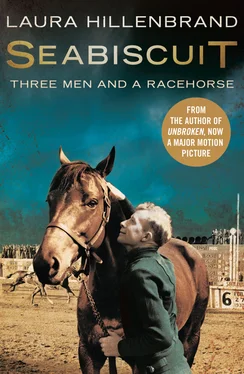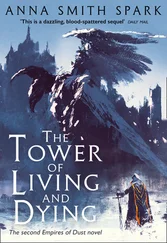On the ground, the jockey was fettered and muted, moving in slow motion, the world a sensory vacuum after the tenfold high of racing speed. In the saddle, emancipated from their bodies, Pollard, Woolf, and all other reinsmen sailed eight feet over the world, emphatically free, emphatically alive. They were Hemingway’s bullfighters, living “all the way up.”
Red Pollard’s Mexican visa, 1932 (NORAH POLLARD CHRISTIANSON)
George Woolf ( CHEERS MAGAZINE)
Chapter 6 LIGHT AND SHADOW
Sooner or later, just about all the bug boys went up the hill. When they began the journey the first time, following the narrow dirt road that turned up from the racetrack, they probably looked very young and somewhat breathless. When they came back, they were half a dollar poorer, twenty minutes older, and decidedly more swaggering at the walk. And the stories they could tell!
“At the top of the hill,” as everyone knew, stood the big cinder-block building that stared down on the track at Tijuana, or “Tee-a Joo-ana,” as they called it. The building was the home of the Molino Rojo, or “red mill,” a shag-carpeted shrine to the world’s oldest profession. It was by far the largest house of prostitution in the world, and probably the most successful. Hovering right over the old Tijuana track, consuming half a city block, topped by an immense spinning windmill and decked out in flashing red lights that were visible clear across the border, the Molino Rojo must have been to the racetrackers what the North Star was to the magi. It took effort for the riders to avoid looking right at it every time they rode in morning workouts or circled the barn walking hots. The jockeys called it “ the house of the wilted pigeons.”
The Molino Rojo had no madam. The girls ran the place themselves, and they did so with the cunning of robber barons. It was no surprise to them that half the people at the racetrack were unsupervised hellraisers gripped in the ferocious throes of puberty. Surely it was more than happy coincidence that the price of admission—“fifty cents, straight up,” remembers one former bug boy—was precisely equal to the pay for galloping a horse. Any rider who made it up the hill had his beer paid for, compliments of the house. And in the unlikely event that a lad wasn’t quite in the mood, he would be ushered into the house theater to be inspired by an exotic blue movie. There were so many girls to choose from, every conceivable nationality, that a kid would have to gallop three hundred horses to afford them all. He could walk down the long, narrow halls, off of which were countless fabulously appointed bedrooms, listen to the girls beckoning in soft Spanish, and simply take his pick. “You went through there,” remembers one client, “like you were going through a grocery store.”
The girls took customer service seriously. Velvet-Tongued Velma and Chi Chi Grande needed no introduction. A girl the riders called One Wing Annie did a brisk business despite missing one arm. One girl told a bug boy that if he could track down $5, she’d show him something he’d never forget. Five dollars was the kind of money you could live on for a week back then, but practical considerations were unlikely to occur to a bug boy in such a situation. Within moments, a herd of jockeys packed into a room at the mill and showered $5 worth of nickels and dimes on the girl in question. She promptly stripped naked, lit up a cigarette, and blew smoke rings from a place into which only a creative-minded and supple-bodied prostitute would think of placing a cigarette. It was the greatest day of the bug boys’ lives. “What talent!” recalled a witness. “Of course, I had to change my brand of cigarettes after that.”
The Molino Rojo set the standard for Tijuana. The jockeys lived high and hard, riding by day, roaming the town in dense, noisy scrums by night, pouring into the Molino Rojo, then the Turf Club saloon, then on to wild exploits in town, chasing giggling girls buck naked down motel corridors, stealing all the room keys to the town’s biggest hotel. Among the riders were Red Pollard and George Woolf. It was to this strangely bountiful place that they came each winter, and they thought of it as home. Riding there from fall to spring every year, they defined themselves as athletes and as men.
In 1928, their first full season together, they took the racing world by storm. Settling into his niche as a miracle worker for tough and neurotic horses, Pollard earned assignments on nearly three hundred mounts and guided them to more than $20,000 in total purse earnings. His fifty-three winners placed him in a tie for twentieth in winning percentage among fully employed riders in North America (those with one hundred or more mounts). He was a complete success. But Woolf was supernatural. Though in the big leagues only a few months, Woolf was signed on to ride more than 550 mounts, many of whom were stakes horses of the highest quality, and won with more than 100 of them for total purse earnings of $100,000. His winning average of 19 percent ranked him in a tie for sixteenth among fully employed riders. As the weekday wonder and the money man, Pollard and Woolf established themselves in the uppermost tier of North American racing.
They also carved out their own respective roles in the social world. Pollard, with his books, his stories, and his offbeat sense of humor, earned the bewildered affection of everyone at the track. A small cadre of racetrack eccentrics gathered around him. In the jockeys’ room he orchestrated a string of clever practical jokes, sequestered himself in corners to pore over literature, and mystified his fellow jocks with aphorisms from Omar Khayyám and “Old Waldo” Emerson. A passing incident might inspire him to gallop through huge sections of Shakespeare, committed to memory, leaving the bug boys furrowing their brows. His language was a patchwork of cultivated speech and blue-streak profanity. He was loved for his wicked humor, delivered with a Buster Keaton straight face, and boundless generosity. He was feared and admired for his fistfighting skills, drop-of-a-hat volatility, thundering bass voice, and daring.
He was a prolific yarn spinner. One tale featured Pollard riding racehorses for Czar Nicholas. He could slip this one past the bug boys, who hadn’t gone to school long enough to know that the Bolsheviks had put an end to poor Nicholas when Pollard was only nine. Another favorite described how he inadvertently bedded down beside five hibernating bears in a Canadian cave. Hair grew on this story until the bears were wide awake and the ex-boxer was using his deadly left hook to knock all five unconscious. When he wasn’t telling stories, he was smartassing racing officials. He once attended a racing banquet at which a racing starter was the keynote speaker. The starter was notorious for his profanity, specifically his trademark phrase “Put a twitch on that son of a bitch!” referring to a restraint device that was pulled over horses’ upper lips to distract them while they were being loaded into the gate. As the host droned through the starter’s introduction, Pollard fidgeted in the crowd, slurping up champagne and, like everyone else, stagnating in boredom. As the starter rose to speak, clearing his throat for effect, Pollard abruptly stood up. “Put a twitch on that son of a bitch!” he boomed.
In the rough-and-tumble world of the track, Pollard was something of a sheriff. Farrell Jones, who rode alongside Pollard, recalled a fight he got into with a veteran jockey in a dispute over a checkers match. When Jones won the match, the older jockey flipped the board across the room and promptly tackled him. Jones, who was only thirteen and weighed little more than eighty pounds, quickly found himself on the losing end of the tussle. The older jockey pounded him mercilessly and tried to jam his thumbs into his eyes. Pollard swept up to them, grabbed the attacking jockey by the back of the neck, tossed him to the ground, and pinned him. Pressing the jockey to the floor, he pinched his nose between his fingers and twisted it. The jockey howled for mercy. After letting him squirm for a while, Pollard released the rider, who had blood running from his nose and tears streaming down his face. “Don’t you ever touch that kid again,” Pollard hissed. He stalked off, leaving the room in silence. Nobody ever messed with Red.
Читать дальше











